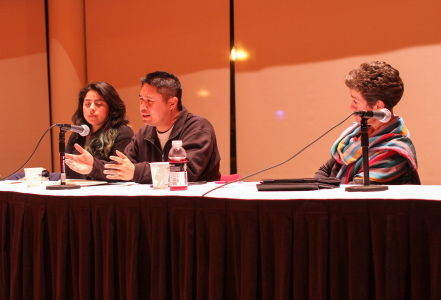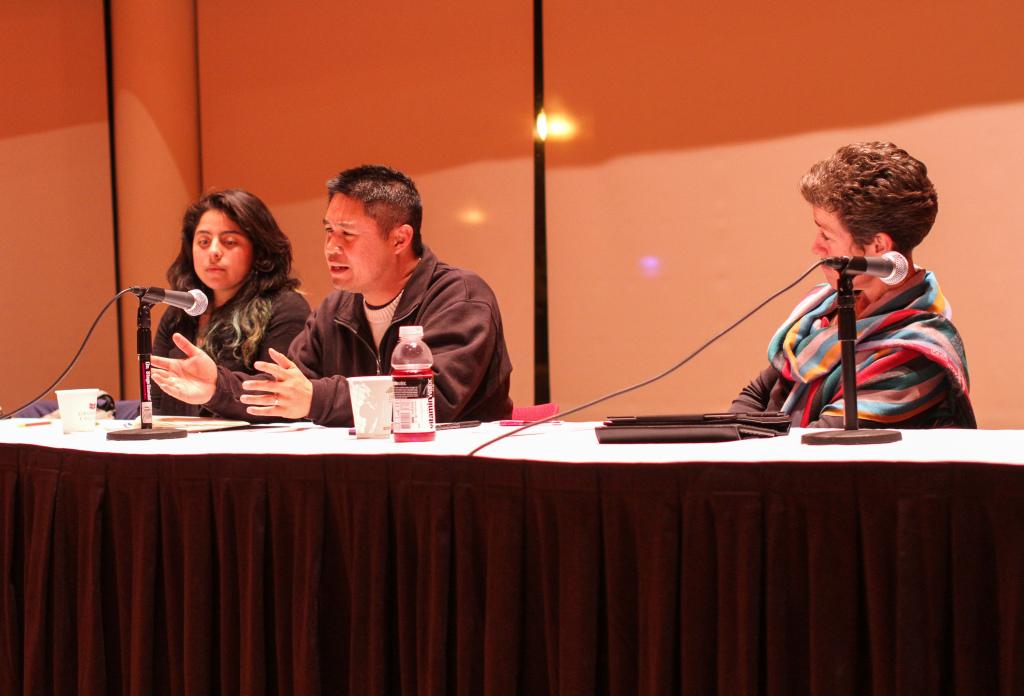Members of SGA hosted a panel discussion on Tuesday evening in JRC 101, which focused on the individual experiences of Grinnellians regarding the issues of class, diversity and adversity. The session was sparsely attended, but was highly engaging as the panelists, audience and moderator freely conversed about class at Grinnell in the discussion-oriented hour.
The panel was composed of Amy Flores ’15, Professor Albert Lacson, History, Deanna Shorb, Dean of Religious Life and Jackie Brooks ’15, the SGA Diversity and Outreach Coordinator.
Moderator Emma Lange ’16, the SGA Administrative Coordinator, asked the panel and the audience questions such as what offended them about class, what didn’t offend them, when class identity felt most salient and how the campus community could better embrace class. The conversation mostly covered how Grinnell’s campus culture interacts with class.

Photo by Aaron Juarez.
“Being at Grinnell has definitely made class a very prominent thing, for me at least,” Brooks said.
Brooks also noted the seeming hypocrisy of Grinnellians believing that class is a commonly talked about topic, when it really isn’t, in her mind. Shorb added that there are other aspects of the discussion of class that can also be offensive, but often go unnoticed.
“What offends me the most about class is the assumption of shared experience,” Shorb said.
Assumptions were a strong focus of the session. Narren Brown, Director of Intercultural Strategic Analysis and Engagement, noted that in many ways, people make assumptions about others based on their class or their background, which is problematic.
Another common theme was that of privilege and the recognition of having privilege at Grinnell. SGA President Opeyemi Awe ’15 emphasized how important it is for everyone to recognize the class privilege they have, regardless of how much.
Generally, the session was based on personal narratives and anecdotes revolving around issues of class. Many of these acknowledged the differences between students of different classes, and issues that some students have that others do not have to face. Participants also told stories of finding strength in their family or campus members in the same class as them.
Audience members commented on the difficulty that some students have in keeping up with their courses and meeting with professors during office hours when they work a fixed schedule including dozens of hours of work a week. Another issue mentioned was the embarrassment of having to talk to a peer student when speaking to the financial aid office in a public area, rather than in a private room with staff member.
Jesus Villalobos ’17, who attended the session, shared anecdotes about the difficulties of coming from a working-class background and handling responsibilities as a Grinnell College student. He considered the panel to be a “productive first step” and in some ways “enlightening” and was glad that students were able to converse with College employees on class issues.
“You have people who sit on faculty, people who are part of the administration who aren’t necessarily aware of the types of issues and problems that some of the students actually have,” he said. “For me, it served a purpose of hearing how some of the faculty and the administration felt and responded to the types of issues students were bringing up.”



















































